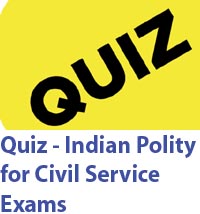501 Q) A judge of the High Court can be removed from office during his tenure by
(a) The Governor, if the State Legislature passes a resolution to this effect by two-thirds majority
(b) The President. on the basis of a resolution passed by Parliament by special majority
(c) The Chief Justice of the Supreme Court on the recommendation of Parliament
(d) The President on the recommendation of the Chief Justice of the concerned High Court.
502 Q) In which State were direct elections to all the tiers of the Panchayat held first after the 73rd Amendment came into force?
(a). Andhra Pradesh
(b) Rajasthan
(c) Karnataka
(d) Madhya Pradesh
503 Q) The Preamble to the Indian Constitution reads
(a) We, the people of India ..... adopt, enact and give to India this Constitution
(b) We, the people of Constituent Assembly, adopt, enact and give to India this Constitution
(c) We, the citizens of India adopt, enact and give to ourselves this Constitution
(d) We, the people of India in our Constituent Assembly adopt, enact and give to ourselves this Constitution
504 Q) The Chief Justice of India can recommend names for appointment as judges of State High Court
(a) at his discretion
(b) in consultation with two senior most judges of Supreme Court
(c) in consultation with four senior most judges of Supreme Court
(d) in consultation with any two judges of Supreme Court
505 Q) Which of the following cannot be altered by the Parliament by ordinary legislative procedure?
(a) Acquisition and termination of citizenship
(b) Privileges of the Parliament
(c) Composition of State Legislative Councils
(d) Representation of States in the Parliament
506 Q) Consider the following
(1) Supreme Court's power to issue writs is narrowed than that of High Courts
(2) A citizen is free to approach High Court or Supreme Court as he chooses, whenever his fundamental rights are violated
(3) The law declared by the Supreme Court is binding on all courts throughout India
(a) 2 & 3
(b) 1 & 2
(c ) 1, 2 & 3
(d) 1
507 Q) With reference to Union Government, consider the following statements:
1. The Constitution of India provides that all Cabinet Ministers shall be compulsorily the sitting members of Lok Sabha only.
2. The Union Cabinet Secretariat operates under the direction of the Ministry of Parliamentary Affairs.
Which of the statements given above is/are correct?
(a) I only
(b) 2 only
(c) Both 1 and 2
(d) Neither 1 nor 2
508 Q) Who enjoys the distinction of being the first leader of the Opposition in the Lok Sabha?
(a) Ram Subhag Singh
(b) Y.B. Chavan
(c) Atal Behari Vajpayee
(d) None of the above
509 Q) The delimitation of the territorial con-stituencies in India is the responsibility of
(a) President
(b) Governor
(c) Election Commission
(d) Parliament
510 Q) In which among the following cases the prisoners are entitled to rights under Articles 14,19 and 21 of the Constitution of India and these articles operate within the prison?
(a) Sunil Batra's case in 1978 .
(b) Nandini Satpathy's case in 1977
(c) Maneka Gandhi's case in 1978
(d) Indira Nehru Gandhi's case in 1976
|
Attempt -Indian
Constitution Next Quiz Here
|
||||||||||||||
Advertisements

No comments:
Post a Comment